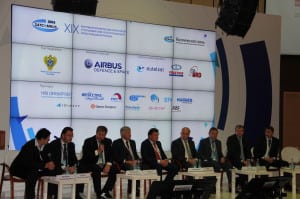Latest News
[Via Satellite 10-09-2014] Developing satellite communications infrastructure in Russia is still a top priority for the Russian government. This was one of the main takeaways of SatComRus 2014 where key executives from the Russian satellite industry and government officials debated the industry’s future against the backdrop of a turbulent political and economic climate, where the talk of sanctions against Russia was never far from the surface.
Igor Chursin, Deputy Head, Federal Communications Agency (Rossvyaz), told attendees it is was very important for Russia to protect its orbital slots, as well develop the space industry in the country as a whole.
“We want to develop communications in Central Russia as well as the Far North and Far East of Russia,” he said. “Social economic development of Russia is unthinkable without improved telecommunications. In this industry, one of the main thrusts is the satellite industry. We cannot survive without satellite communications. In terms of the government’s regulatory role, a step forward is needed. We need to develop our constellations. We are coming out with proposals to develop our industry.”
Chursin spoke of the need to develop Russia’s national development program in tandem with the space development program, stating that the two went hand in hand. Chursin said the Russian government plan was to have 100 percent coverage of Russia including the remote areas of the North. The key political thrust was to try and remove digital disparity, as well as help responses in emergency situations. The Russian government wants to make broadband available to all layers of the population.
“We have developed several proposals for implementation of this program. These programs will reshape the space industry. For each orbital point, we want to have unique satellites,” added Chursin.
Yuri Prokhorov, Russian Satellite Communications Company (RSCC) director general, told the event that it has plans to become the fifth biggest FSS operator by 2020. The company also hopes for a successful launch of the Express AM6 satellite later in October aboard a Proton rocket. RSCC is hoping to reconfigure its satellite constellation, as well as target new growth markets such as Australia where the operator is beginning to have a presence. Prokhorov’s colleague at RSCC, Andrey Kirillovich, director of the department of integration services and comprehensive projects for RSCC’s Business Development Services (BDS), echoed the point saying the operator needed to “depart from regional coverage into more international dimensions.”
“We intend to enter a number of new markets. We are working with cellular operators, telcos in the Middle East. Maritime in the Persian Gulf is an area of interest for us. Latin America is also quite an interesting region for us. We intend to put together a service platform there. Africa is the second new region for us. We are also making a comeback in India. In a few years’ time, we plan to work in six regions rather than three,” he said.
The talk of the impact of economic sanctions on Russia was never very far away with a number of speakers touching on the subject. Nikolai Orlov, regional vice president for Eutelsat, said he hoped that the sanctions would not impact satellite projects in Russia.
Yury Vygonskiy, deputy general designer, space systems development, general engineering and satellite control at JSC ISS-Reshetnev, said the feeling was mutual.
“We want to diversify our business. We are open to cooperation with other countries. Because of the sanctions, we will be forced to modify some of the equipment. As of today, we will need many months more. We have already started work on programs. By the middle of the next year, we will be able to restore original scheduling in Russian and international markets. We are not intending to quit the international market. Sanctions not only impact Russia operators but international players too,” he said.
Get the latest Via Satellite news!
Subscribe Now